P.S. I Love You Blu-ray Movie
HomeP.S. I Love You Blu-ray Movie 
Warner Bros. | 2007 | 126 min | Rated PG-13 | May 06, 2008
Movie rating
6.2 | / 10 |
Blu-ray rating
| Users | 3.1 | |
| Reviewer | 2.5 | |
| Overall | 3.1 |
Overview
P.S. I Love You (2007)
When the love of Holly Kennedy's life, her husband Gerry, is taken by an illness, it takes the life out of Holly. But before he died, Gerry wrote Holly a series of letters to guide her, not only through her grief but in rediscovering herself. Each one is signed the same way: P.S. I Love You.
Starring: Hilary Swank, Gerard Butler, Lisa Kudrow, Gina Gershon, James MarstersDirector: Richard LaGravenese
| Romance | 100% |
| Drama | Insignificant |
Specifications
Video
Video codec: VC-1
Video resolution: 1080p
Aspect ratio: 1.78:1
Original aspect ratio: 1.85:1
Audio
English: Dolby TrueHD 5.1 (48kHz, 16-bit)
French: Dolby Digital 5.1 (640 kbps)
Spanish: Dolby Digital 5.1 (640 kbps)
Subtitles
English SDH, French, Spanish
Discs
25GB Blu-ray Disc
Single disc (1 BD)
Playback
Region free
Review
Rating summary
| Movie | 1.5 | |
| Video | 3.0 | |
| Audio | 3.5 | |
| Extras | 2.5 | |
| Overall | 2.5 |
P.S. I Love You Blu-ray Movie Review
Dear Sir: Make a Better Movie
Reviewed by Michael Reuben December 30, 2011P.S. I Love You did respectable business in theatrical release (over $150 million worldwide on a $30 million production budget) and continues to perform well on home video. I understand the reasons why, and I can produce both prior reviews and affidavits from character witnesses to prove that I do enjoy romances, weepies and so-called "chick flicks". But P.S. I Love You left me cold for the simple reason that it's not a good film. A member of the target demographic I know recently opined that the film's problem was the (mis)casting of Hilary Swank in the lead, instead of a comedienne like Sandra Bullock. But I think the problem was director and co-screenwriter Richard LaGravenese, who not only fails to find a consistent tone for the movie, but seems to revel in jumping around tonally, even within the same sequence, so that you never know what kind of movie you're watching (and eventually don't care). All that frantic leaping around is needed to disguise the emptiness at the film's core. Kill off a lovable Joe (or Jack or Gerry), and you can dependably draw tears, but that doesn't mean you've said anything worthwhile. I have not read Cecelia Ahern's bestselling novel, on which the film is based, but I suspect she pulled off these shifts more successfully. Ahern set her story entirely in Ireland, where certain styles of both whimsy and dark humor seem right at home. Move the same events to America, as the film does, and they have to be handled differently. And because prose is less specific than film, leaving more for the reader's imagination to fill in, a writer can get away with narrative sleights of hand that a director should never attempt. (Dickens did it repeatedly, which is why the frequent coincidences on which his stories depend go down more smoothly on the page.) LaGravenese should be the ideal filmmaker for the job, because his best work has resulted from melding tonal opposites that, at first glance, shouldn't be in the same film. His Oscar-nominated script for The Fisher King required the unique talents of director Terry Gilliam to balance its idiosyncratic combination of farce, fantasy and tragedy. His directorial debut, Living Out Loud, from his original script, paralleled elements of P.S. I Love You in its exploration of a woman trying to restart her life, but the heroine of Living Out Loud was the divorced survivor of a bad marriage, not a young widow crippled by grief. In his first venture as a director, LaGravenese was free to explore comic and even ludicrous moments, and at one point to stage a Gilliam-style fantasy, without having to worry about addressing such weighty matters as grief, mourning and the loss of one's soulmate. P.S. I Love You requires those issues to be taken seriously, and both the film and the director buckle under the load.
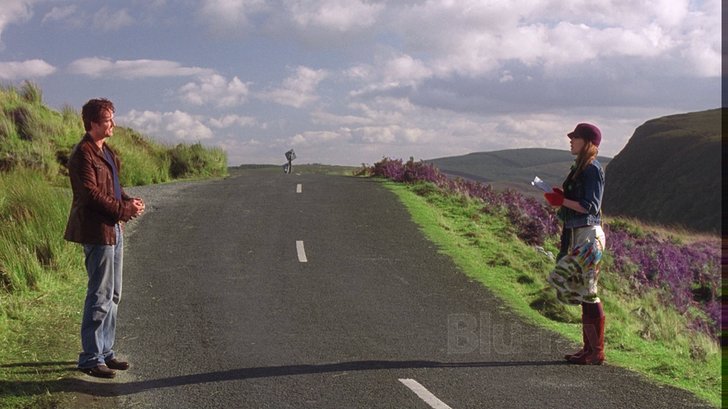
Holly and Gerry (Hilary Swank and Gerard Butler) married young and against both their parents' wishes, but they married for love. Still, the course of true love isn't running smooth. Holly aspires to be a "planner", which is to say that she wants to have a "plan" for their married life that will get them out of their fifth-floor walk-up on New York's Lower East Side, into a much better life (the details of which are vague) where their real life can begin. Holly doesn't quite know what that'll be, but it involves children, and she doesn't have much of a plan to get there either, running through jobs the way some people run through hobbies. Gerry is a free spirit who lives for the moment. He met Holly when she was traveling through Europe (the story comes out piecemeal in flashbacks) and followed her impulsively back to New York. He'd be happy living with her anywhere in any circumstances. In the pre-credit sequence, they're having a fight, because Gerry has said the wrong thing to Holly's mother, Patricia (Kathy Bates), a battleaxe of a bar owner. Then they make up. Then the credits run. When they're over, Gerry has died of a brain tumor, and everyone is at his wake. Right away the film is off track. Irish wakes are legendary for their alcoholic lubrication, and if the setting were still Ireland and Holly herself were Irish, LaGravenese might be able to get away with the comedy he tries to extract from Gerry's funeral rites. But there isn't enough liquor flowing, and the character of Holly as previously established before the credits is too brittle, to create the right mood of laughing in the face of tragedy. So LaGravenese has to rely on secondary characters: Gerry's business partner, John (James Marsters), playing a vulgar Irish drinking song as Gerry requested; Holly's friend Denise, played by Lisa Kudrow with her trademark bluntness, interviewing potential dates; another friend, Sharon (Gina Gershon), doing not much of anything; Holly's sister, Ciara (Nellie McKay), waltzing in like she's attending a party; and Patricia's bartender, Daniel (Harry Connick, Jr.), eyeing Holly with obvious interest. (At least he waits a discreet interval to approach her, until her thirtieth birthday party, when he flirts with Holly as ineptly as possible until she throws up all over his shoes.) Funny stuff, right? When Holly barricades herself in that fifth floor walk-up watching old movies while dirty dishes and take-out containers pile up, it's unclear whether you're supposed to laugh or cry. Certainly the scene where her mother and friends burst in on her singing along with Judy Garland in A Star Is Born is played for laughs. It's Holly's thirtieth birthday, and the group is there to take her out. That's when the letters Gerry arranged to have delivered after his death begin arriving, the ones that all end with "P.S. I love you", which give the film its title and marketing hook and are supposed to help Holly heal and move on. But has anyone ever actually paid attention to what's in those letters? How about the one that sends Holly to a karaoke bar, so that she can recall the wonderful night she had when Gerry dared her up on stage where she made it through one hot verse of Prince's "Gett Off" before tripping on a cable and landing in the hospital with a sprained ankle, broken nose, her face swathed in bloody bandages and, by the look of it, big-time expensive dental work ahead? Good times, treasured memories. Consider, if you will, a character who isn't played for comedy: Holly's mother, Patricia. Even the great Kathy Bates can't quite make sense out of this figure who's more plot device than person. Buried in the movie is one fine scene where, for a moment, Patricia comes to life. It's when Holly tries to tell her mother how much worse off she is because her husband died, whereas Patricia's husband, Holly's father, only left. In Patricia's response, Bates gives you a glimpse of the heartache that rejection caused her—and also of the steel that allowed her to bear the pain while forging ahead and raising two daughters single-handedly. It's a welcome breath of realism in a film that could use much more. Eventually, though, the film betrays even Patricia. When it's over, go back and rewatch this scene, and indeed every other scene of Patricia's now that you know her whole story. Even Kathy Bates can't make them believable. Still, nothing better demonstrates the essential frivolity of P.S. I Love You than its treatment of—spoiler alert!—Harry Connick, Jr.'s incoherently drawn bartender, Daniel. Apparently directed to suppress every last iota of his natural charm (with hair and wardrobe to match), Connick's character is one of the least convincing red herrings imaginable. Despite his obvious crush, Daniel is wholly unsuitable as a love interest for Holly. For that, she has to return to Ireland (in a trip arranged pre-mortem by Gerry), where she meets William (Jeffrey Dean Morgan), a character invented for the movie. Without going into details, let's just say that William could fairly be described as the second coming of Gerry. In the end, all the film's blather about living for the moment and appreciating what you have now turns out to be so much misdirection. The real solution to Holly's predicament comes from remaining stubbornly stuck in the past until it repeats itself. Only better this time, because Holly later returns to Ireland, this time bringing her mom to be charmed and won over by the countryside and a bit o' blarney from an older gentleman. Meanwhile, rugged William stands to one side with a roguish smile. He might as well have a sign over his head that says, "I am the resurrection and the life—of Gerry." Snap!
P.S. I Love You Blu-ray Movie, Video Quality 
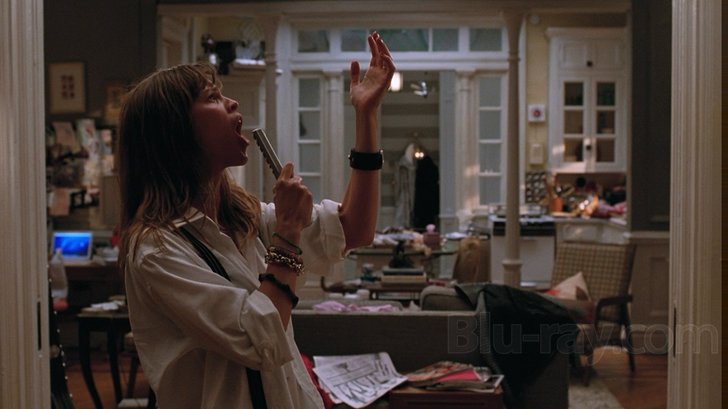
Cinematographer Terry Stacey is primarily known for independent fare like Friends with Money and American Splendor, but he has given P.S. I Love You a big studio sheen that translates effectively to Warner's 1080p, VC-1-encoded Blu-ray. The intense greens of the Irish countryside are impressively represented, but so are the characeristic blues and blacks of New York City at night. LaGravanese knows his locations, and he has selected quite a few that haven't been photographed a million times. Stacey has lit them to look their best but still at the outer boundaries of realism. (The Lower East Side, for example, looks picturesque but not luxurious, which is about right.) Detail is good, though not exceptional, because the image is somewhat softer than is typical of contemporary productions; this may reflect the fact that, at least according to the credits, P.S. I Love You is unusual among contemporary productions for not being finished on a digital intermediate. Still, black levels are generally acceptable, and there is no evidence of high frequency filtering. An occasional shot betrays some amount of the "ringing" associated with artificial sharpening, but the issue is transient and minor. With limited extras, the 2:06 film manages to squeeze onto a BD-25 without noticeable compression artifacts.
P.S. I Love You Blu-ray Movie, Audio Quality 
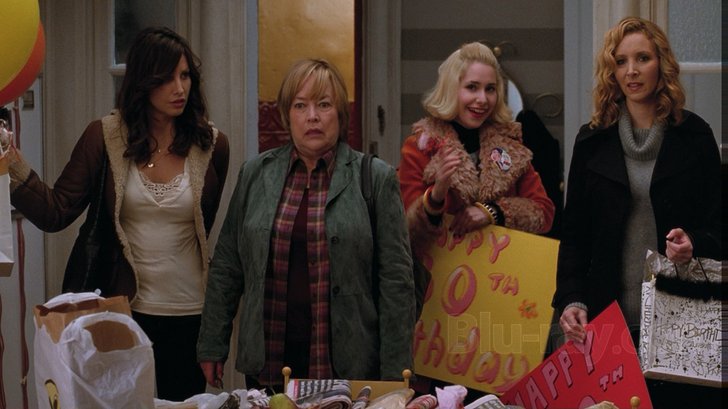
The 5.1 mix for P.S. I Love You, presented here in Dolby TrueHD, is functional but unremarkable, using the rear channels for little more than support for the front soundstage and a general sense of ambiance. The audio presentation allows breathing room for the multiple music performances encompassed within the film (karaoke bars would be great places to visit if every person who got up on stage had a voice like Gerard Butler's) and does a nice job presenting John Powell's score, which has to do a lot of the heavy lifting in the big emotional moments. The dialogue is always clear and intelligible, which isn't necessarily to the film's advantage.
P.S. I Love You Blu-ray Movie, Special Features and Extras 
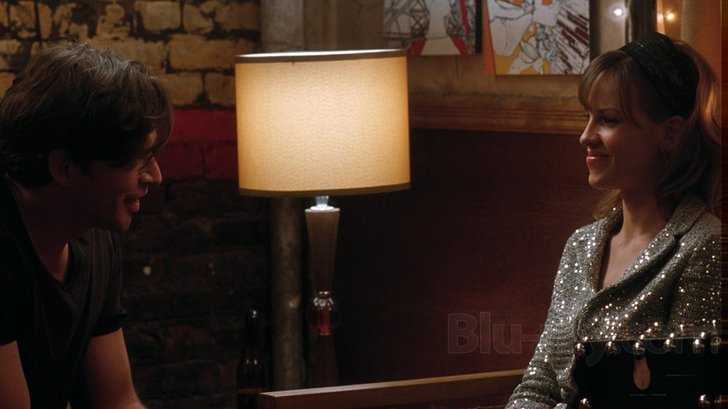
- A Conversation with Author Cecelia Ahern (HD, 1080p; 1.78:1; 7:33): Ahern was only 21 when her novel was published, and she still seems genuinely overwhelmed by its success. She's realistic about the transformations wrought in a story once one sells the rights to Hollywood. Listen closely and you learn that the original script was set entirely in America (whereas the novel was set entirely in Ireland). It was LaGravanese who managed to get Ireland back into the film, which no doubt added millions to the box office.
- The Name of the Game Is Snaps (SD; 1.33:1; 4:49): After an extended tease, this short provides the rules of the game briefly seen in the film on Holly's 30th birthday.
- Additional Footage (SD; 2.35:1, non-enhanced; 12:20): There are four scenes, all of them interesting, but perhaps the most interesting feature is that every scene has been framed for 2.35:1, while the movie's original aspect ratio, according to all available sources, was 1.85:1. (I did not see the film theatrically.) The first scene shows Holly and her mother and friends attending some sort of performance by her sister, Ciara; the scene is partly interaction among the group and partly a gag reel with Nelly McKay trying to improv Ciara's show. A second scene involves Holly and Denise waiting for a double date and provides an interesting moment for Lisa Kudrow. A third extends the visit to the travel agent played by Sherie Rene Scott into a flashback of Gerry arranging the trip to Ireland; it was no doubt cut, because it showed Gerry in an advanced state of illness. The fourth scene would have come at the end of the film and revealed an additional letter from Gerry that was not addressed to Holly.
- Music Video (SD; 1.85:1, non-enhanced; 3:51): "Same Mistake" by James Blunt
P.S. I Love You Blu-ray Movie, Overall Score and Recommendation 
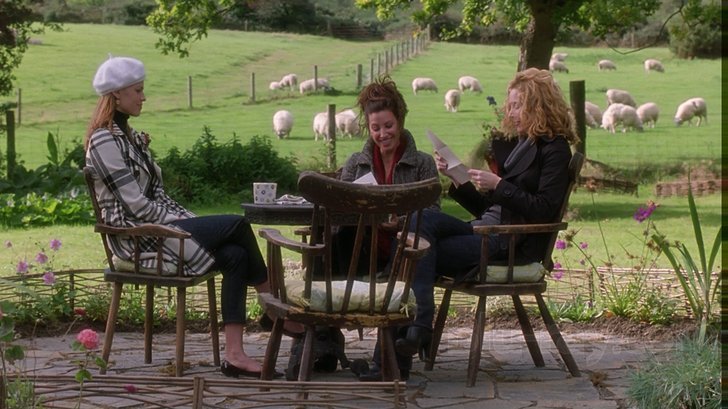
I suspect the audience for this film is already well-established, and any criticisms I have to offer are irrelevant (except for the predictable few who suffer from heart palpitations whenever a reviewer's rating of a film doesn't jive with theirs). In general, though, the Blu-ray's technical merits are acceptable; so if the movie is to your taste or that of someone in your household, then the disc is recommended.
Similar titles
Similar titles you might also like

The Time Traveler's Wife
2009

The Lake House
2006

Dear John
2010

Charlie St. Cloud
Charlie St Cloud
2010

The Vow
2012

The Notebook
2004

The Last Song
2010

Eat Pray Love
2010

A Walk to Remember
2002

The Lucky One
2012

Safe Haven
w/ $10 eBook Offer
2013

August Rush
2007

Nights in Rodanthe
2008

Save the Last Dance
2001

Hope Floats
1998

Step Up
2006

27 Dresses
2008

Remember Me
2010

The Best of Me
Tears of Joy Edition
2014

The Longest Ride
2015